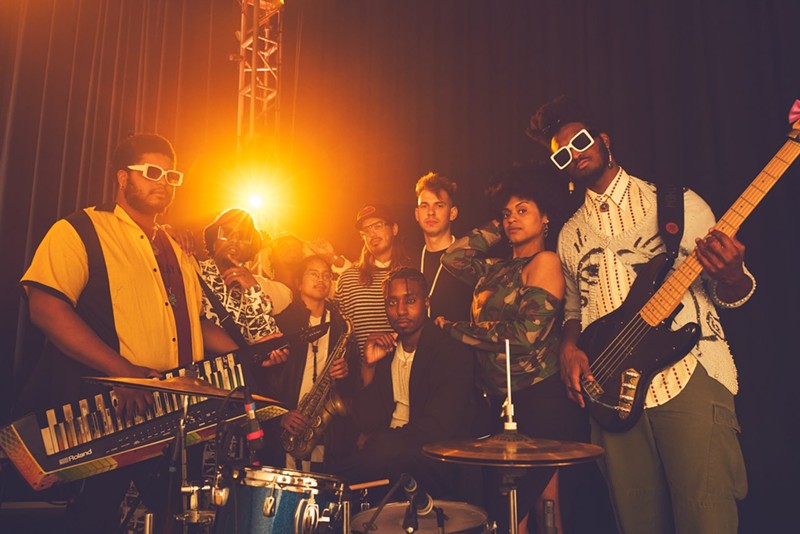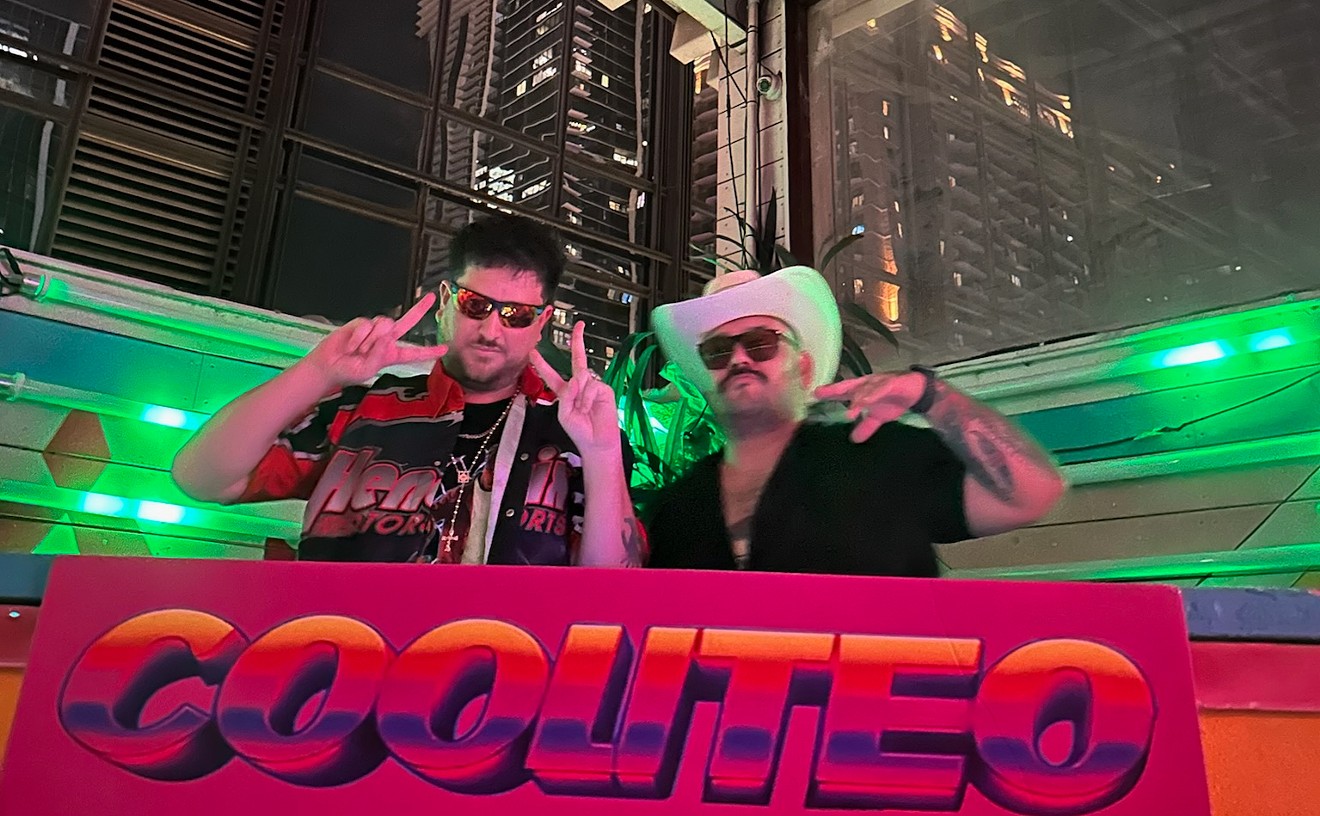McCloud feels like he’s coming into his own personally and as a frontman. That resonates in Cure for Paranoia’s recent single, “Ex and the City” — a dreamy backdrop of vaporwave synths and trilling 808 snares where his humming purrs the line, “I’m back outside again, I mean I walk at 5 a.m. / OK, I found my stride again, my mind’s a safe environment.”
As the lore goes, the band was named and formed (with musical partners Tomahawk Jonez and Jay Analog) to reflect McCloud’s true ambition of the project: a musical outlet to help manage his mental health after a 2015 diagnosis of bipolar paranoid schizophrenia (more recently medically classified as bipolar schizoaffective disorder). But McCloud says there’s an important caveat to that story.
“The whole story behind my band was that I was on medication and then I quit the medication because the music was just so much more beneficial than the medication," he says. "That was the story that I was putting out there. “When in reality it’s, like, I [wasn’t] taking my medicine anymore, but I [was] replacing it with drugs and alcohol to not feel anxious, and to not be anxious when I'm performing.
“And then the next day, [I was] just dealing with the flood of anxiety that I didn't necessarily do away with, I just kind of put a dam up to it. And then like that next morning after the party's over, that dam breaks and then I’d just get flooded with everything that I was putting off to the side.”
McCloud describes his experience of alcoholism as “the equivalent of cleaning up your room really quick, when your mom tells you to. And then she comes in like, ‘Oh wow, it's really clean in here,' but then you open the closet and, like, a pile of clothes falls out. And you look under the bed and all your shit's a mess under there. It’s not actually doing the work and organizing those thoughts and emotions.”
At his lowest point, McCloud recalls spending a New Year’s Eve crying in his bandmate’s car, scared and praying not to go to sleep drunk again.
Like many anxious people, McCloud doesn’t like downtime. He feels like he always needs to be doing something. And like many artists, he’s got a nagging urge to create, at odds with a tendency to procrastinate. He references an adage he read in the early days of Cure for Paranoia: “Procrastination is just anxiety in disguise.”
“When I am procrastinating working on stuff, I know it's just me [worrying] if it's gonna be good enough,” McCloud says. “Is it gonna resonate with enough people? Am I actually gonna like it? I don't want to create anything that's not groundbreaking. And it sucks that the gauge for something groundbreaking is like, getting a good response on social media. I don't know, I'm not a big fan of that perception of creativity.”
Nowadays, McCloud channels his anxiety more sustainably, usually by hitting the gym, where he finds a sense of mental and physical self-care. When he starts to feel the dam bloating up in his brain again, he feels like he stays on the right track as long as he’s doing something beneficial to his wellness.
He doesn’t claim to be 100% sober, and his experience with recovery hasn’t been a linear journey. But, thanks to the time he spent in an intensive outpatient recovery program for alcoholism followed by a two-and-a-half year phase of abstinence, he says, “I've achieved moderation, which I never ever in a million years thought would be possible for myself, especially when I was first really dealing with alcoholism and stuff.
“They tell you [in treatment], this is not like a cure-all. Just because you're here doesn't mean you're gonna be sober for the rest of your life. However, it is going to affect and impact the way that you view drinking for the rest of your life.”
McCloud also credits his partner for understanding his relationship to alcohol and for reinforcing a healthier lifestyle. His partner also turned him on to his latest wellspring of creative inspiration, the reality show competition RuPaul’s Drag Race.
“I literally tore through every fucking season of RuPauls' Drag Race, even some all-stars seasons, from Season 3 all the way up to like 16 or 17,” McCloud says. “And then when I was done with that, I literally wrote ‘CPT’ [another recent Cure for Paranoia single] in five minutes sitting in the studio. And I do think it's like a part of being a big experience [driven] person. I have to watch or do something that's gonna change the way that I look at everything.”
Part of coming into his own as a frontman means that Cameron McCloud has become more comfortable expressing his queerness, and queer culture, in his lyrical content. He never wanted to be pigeonholed as a gay artist, or the kind of artist who only makes music for specific communities. So for much of his music career, McCloud has kept his personal life and sexuality out of focus from Cure for Paranoia.
“For a long time, it was the kind of thing where, if you know you know,” he says. “I've never wanted to come out. I've never wanted to do that whole sort of thing. I've literally just wanted to be me and have that be the end of it. Nothing's changed. RuPaul hasn't knocked on my door yet.”
In new Cure for Paranoia singles, McCloud freely expresses his true self in lyrics such as, “Don’t need vitamins to keep this D inside of him, so gay” and “Binge watch me lil bitch if you wanna know how it’s done / By day we serve tables, by night we serve cunt.”
Cure for Paranoia is now performing with Dallas soul groovers, We Them Grays, a large band including keys, synths and a horn section. They showcase Cure for Paranoia’s most lush and expansive sound yet, with so many backing musicians that they spilled off the side stage during this summer’s performance at the inaugural Fair Park rap festival, TwoGether Land.
Right now, there’s no limit for Cure for Paranoia. McCloud feels rebooted spiritually, physically and creatively. While there are no current plans to record another full-length album, the band is set to release a slew of singles this fall to introduce audiences to a new iteration of Cure for Paranoia. It’s a fresh era for the group — and for the Dallas music scene.
Cure for Paranoia's new single, "Love (Again)" is out now. They play on Friday, Sept. 27, at the Kessler Theater, 1230 W. Davis St., with We Them Grays, Curl and Scuttino. Doors open at 7 p.m.













